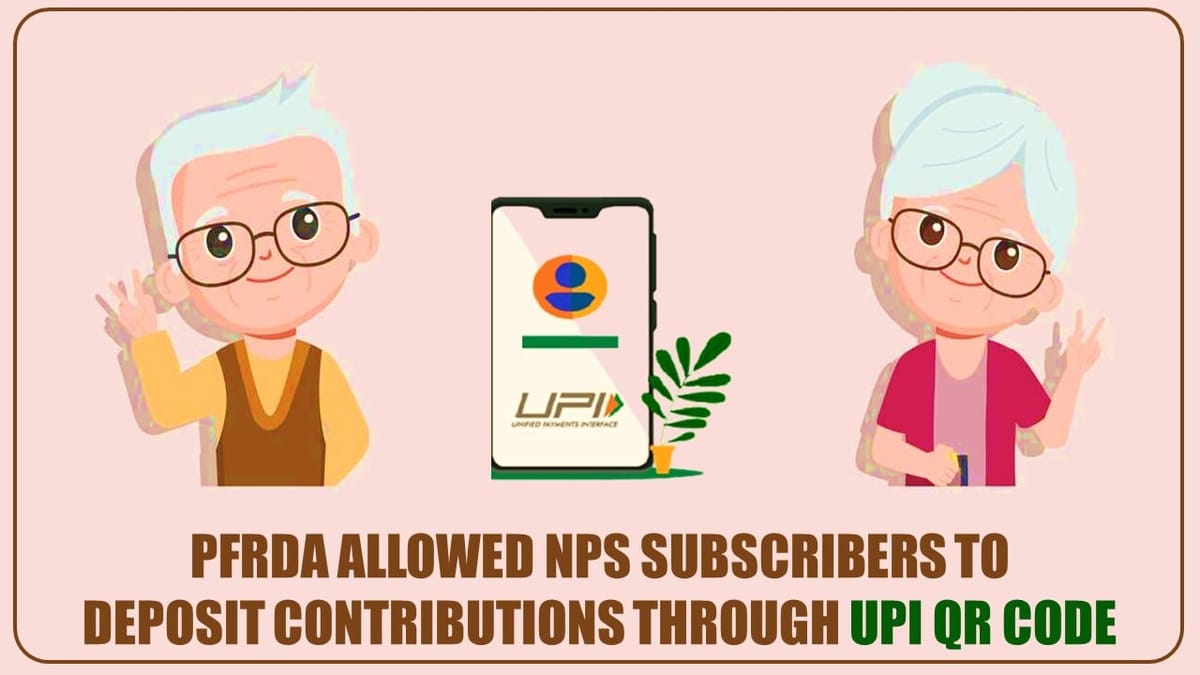Priyanka Kumari | Dec 23, 2023 |

PFRDA now allows NPS subscribers to deposit contributions through UPI QR code for D-Remit
The Pension Fund Regulatory and Development Authority (PFRDA) has made a substantial improvement to the D-Remit process by allowing National Pension System (NPS) subscribers to deposit their payments using the ease of the Unified Payments Interface (UPI) QR code. This development intends to make simplier the contribution process for NPS participants, making it more accessible and efficient.
For those hoping to secure their financial future, the National Pension System (NPS) has long been a reliable savings avenue. Subscribers make voluntary contributions to their NPS Tier I and II accounts under the NPS. However, the procedure of directly depositing these contributions, known as D-Remit or Direct Remittance, has recently become easier to use.
The release of the QR code – UPI for D-Remit is a significant and game-changing move toward making NPS contributions more accessible, productive, and versatile. PFRDA’s initiative encourages NPS subscribers to take control of their savings for retirement and get the benefits of systematic investment planning.
D-Remit Virtual Account with QR Code for UPI:
Subscribers will use the UPI QR Code to transfer their contributions under this new mechanism. It is vital to remember that the D-Remit virtual account is not the same as the PRAN (Permanent Retirement Account Number). Further, the virtual account numbers and QR codes differ for Tier I and Tier II NPS accounts.
Key Advantages of D-Remit QR Code:
The D-Remit process provides various benefits to NPS subscribers:
Investment on Same-Day: Contributions received before 9:30 a.m. by the Trustee Bank (TB) will be invested the same day, maximizing returns.
Periodical Auto Debit: Subscribers can set up repeated auto-debit payments, such as monthly, quarterly, or semi-annually, making it easier to save for retirement.
Regular or One-Time Contribution: The ability to choose between one-time and recurring payments based on personal preferences and financial goals.
Optimised Investment: The D-Remit approach uses standing instructions and rupee cost averaging to create long-term retirement wealth.
SIP in NPS through D-Remit:
The D-Remit process enables NPS account holders with a PRAN to begin a systematic investment plan (SIP). This is done online (D-Remit), allowing subscribers to set up automatic SIP payments to their NPS accounts.
SIPs in NPS allow subscribers to make regular contributions, allowing them to develop a disciplined and easy approach to retirement savings without having to time the market. SIPs, like mutual funds, allow NPS participants to take advantage of rupee cost averaging. Making changes to current investments becomes a simple process with the potential for improved returns.
Use D-Remit QR Code:
Subscribers must have a virtual D-Remit ID with the trustee bank to use D-Remit. This digital account is only for remitting NPS contributions. Setting up a SIP via net banking includes adding the virtual account as a beneficiary to the subscriber’s net banking account and setting up a standing instruction for the SIP amount. Subscribers will get the same-day Net Asset Value (NAV) in their NPS accounts with a fund-receiving cut-off time of 9:30 AM. Contributions received after this time or on non-working days will be calculated using the NAV of the following working day.
In case of any Doubt regarding Membership you can mail us at [email protected]
Join Studycafe's WhatsApp Group or Telegram Channel for Latest Updates on Government Job, Sarkari Naukri, Private Jobs, Income Tax, GST, Companies Act, Judgements and CA, CS, ICWA, and MUCH MORE!"